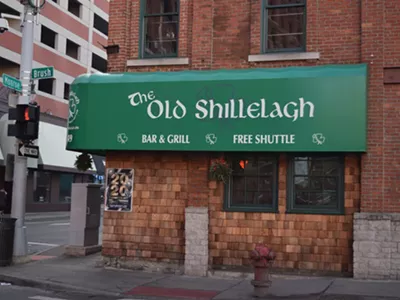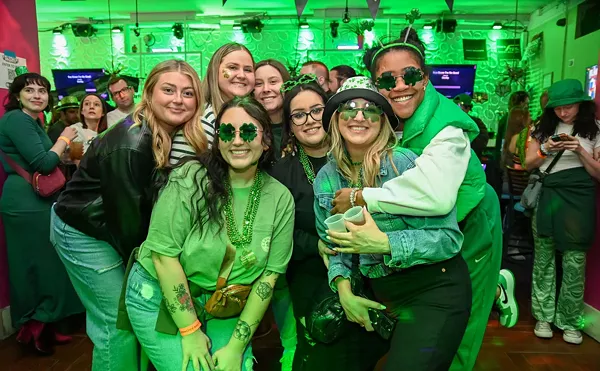Excerpt from Grievers
By adrienne maree brown
[Excerpt from Grievers, a novella by adrienne maree brown, set for release in fall 2021 to launch the Black Dawn Fiction imprint at AK Press]
Dune let herself get close to the model city, the four tables covered in little plastic trees, patches of green felt for open space, small buildings gathered from board games, trinket stores, her own abandoned toy collections. It was always summer on the model. It was her first time really taking it in as an adult.
Standing north of the city, the basement stairs behind her, she could look down Woodward all the way to the blue silk scarf that was the Detroit River, the city's southern border, a major barge thruway. She moved around in a circle, walking down the eastern edge of the model. Standing at the river, Canada at her back, the tall GM/RenCen buildings were at her waist, the Greektown casino near her right hand. Opposite her, beyond the North End, waited the wooden stairs up to the open basement door and her mother's world.
This was her late father's realm.
Brendon had done an amazing job of re-creating the city. Downtown was built to scale. Dune recognized the massive L shape of Cobo Hall, the Westin a few inches north, the People Mover frozen on its useless circuit. There was a switch somewhere that was supposed to turn it on, but she couldn't remember if Brendon had ever gotten it to successfully chug its loop.
Her prescient father had argued on behalf of real public transportation. It had come, imperfectly, in the form of a light rail a couple of years after his death. It was supposed to expand to the west and east this year, actually reach neighborhoods beyond the gentrification zone. She wanted to tell him.
Though, maybe nothing would happen this year. Beyond the newest virus making her people sick, Detroit had been rationing water for some time — not for lack of water, but because of greed and mismanagement. Two years ago, the city council had finally implemented a rightsizing plan, denying services beyond the downtown area, creating havoc and resistance north, southwest, east.
And beyond the city borders? The country was imploding along fault lines of race and fear. The norm was stolen elections, rampant corruption, a bought-and-sold media, gutted and turbulent schools, and a never-ending and unclassifiable world war.
A crumbling age. Maybe nothing would ever be built again.
Dune leaned closer. North of the defunct train, I-75 cut a path along the upper edge of the stadiums. Brendon had spoken of hooking up light and sound to the model and being able to recreate game nights, though Dune didn't get it. He'd always said it was the worst thing that happened in Detroit, getting swarmed by drunken White people from the suburbs who threw beer cans all over the downtown streets and stopped up traffic, honking in tones that were identical in victory or defeat.
Maybe, probably, games were canceled due to the Syndrome.
Dune hoped. A shadowy upside.
Just above 75 was an area Kama and Brendon used to take her often, to look at, to long for: Black Bottom. The stunning houses were mostly empty, boarded up or shelled out by arson, but Kama had told Dune stories of the elegant Black people who had lived out of those homes, where each family was a part of the city's glamour. Kama had often spoken of growing up and having one of those homes, on the block where Joe Louis and Sugar Ray Robinson had been neighbors, or the home where Delloreese Early was born years before she became Della Reese.
Brendon had glued multiple smaller house pieces together with curved Lego attachments to approximate the unique structures they loved. His makeshift neighborhood signposts had the oldest known names of places on the bottom, moving up, each slip of paper a newer name, occasionally with gentrified hood brands in sardonic quotes. In the center was the largest sign, which said, "Detroit (pop. 1,942,567)." Under this was "Fort Pontchartrain du Détroit," then "Le Détroit du Lac Érié," and finally "Anishnaabe/Kickapoo territories, Mound Builders."
Who were the Mound Builders? Dune didn't want an internet search response. She knew she missed her father when she came across these questions that would never be answered, not in his way. He told stories to say a word.
Above the highway, maybe 1/4 up the model, was Mack, which became Martin Luther King Boulevard once it crossed the central meridian of Woodward heading west. It was no fancier for the formal name. The entirety of Mack/MLK was pockmarked with potholes that were refilled each spring, re-formed each winter, strewn with drug detritus and napping drunks, so that's what her father had recreated.
Her father had done a particularly good job recreating Eastern Market, the largest open-air farmer's market in the country, tinfoil and brick sheds with lots of small flowers and fruit piled underneath. Dune and Brendon had volunteered at the Grown In Detroit stand together every summer of her teenage years, Brendon interviewing every customer about their Detroit stories, Dune rolling her eyes and gathering cash.
Back across 75, two blocks west and six blocks north, stood the house she'd grown up in, the house she sat in now, nearly alone on its block. Gerald and Nina's bright purple house sat across the street, with two languishing apartment complexes on opposing corners, fenced in, as if they had valuable things inside.
Dune touched the model house that her father had made into their home — it was just a little Monopoly game house glued on top of a flat Lego, but Brendon had brought her and Kama downstairs when he painted it. She could see him now, his face soft with pleasure as he gripped the little building in tweezers, dipping it into the actual sunbright yellow paint they'd used on the house's facade, and placing an X on top with a mangled paper clip. Detroit was his treasure map, home was his gold.
His placement was specific. Dune knew her parents had been proud of this house, of holding a radical enclave in the heart of the Cass Corridor. They had never adopted the "colonizer name" of Midtown that was cast over the neighborhood in the erasure trends of gentrification. Her parents had loved their outpost, even as they watched the heart of Detroit go pale outside their windows.
Now sunlight was shining on the model house. Dune looked around, trying to see if there was a hole in the wall or ceiling somewhere. There were no windows down here ... but there was sunlight, a bright, active beam on the small house. Dune waved her hand over the house, but could not block this light.
adrienne maree brown is a writer living in Detroit.






